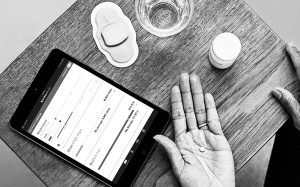
For those of us who struggle, the most effective adherence booster may be giving doctors and patients the time to explore the beliefs and attributions informing medication behaviors. These conversations can’t happen in a 15-minute visit. Given how little our health care system seems to value such interactions, it’s no wonder that skepticism often greets these new, unproven, and costly technologies. But though this skepticism may be warranted, it may also reflect a fear that the technology is intended to replace our efforts, rather than facilitate them. For technologies like digital adherence monitoring to do their jobs, we have to be willing to let them help us do ours.
The beauty of Rosenbaum’s writing is her capacity to make me think. A few thoughts:
Digital adherence monitoring must be considered in the context of care
I’m more optimistic than Rosenbaum about the potential for digital adherence monitoring. In the proper context it can play a role in understanding behavior patterns which may lead to critical conversations with patients. Immunosuppression medication in a child dependent upon a less-than-reliable parent is one example that comes to mind. Rationalizing with adults over statin adherence is different than assuring the appropriate care of children.
Fear and nostalgia may be medicine’s greatest enemy
Physician skepticism often follows the introduction of new technology like that described in Rosenbaum’s article. Some of this skepticism is driven by fear of replacement and lack of relevance. And when we’re not fearful, we’re wistful. We often get caught up in our recollection of the good old days that never really were.
Doctors are not victims of the future
When doctors aren’t worrying about losing our jobs we sometimes see ourselves as victims of Silicon Valley. We take a deterministic view of the world changing around us. The future is coming and we’re along for a ride that we can’t control. But doctors have a responsibility to help shape where technology goes. Despite her skepticism, Rosenbaum plays a key role in starting this conversation. But we need to go further. Finally, developers need to position their products to better fit between providers and patients.
Even if doctors were given more time with patients as Rosenbaum suggests, medical technology will advance. We need to get used to that. Doctors and technology are not mutually exclusive.